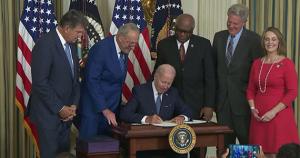Stakeholders seek extension of enhanced subsidies *this* year to stave off carrier uncertainty

I'm obviously a major proponent of making the enhanced ACA premium subsidies originally included in the American Rescue Plan (and later extended by another three years by the Inflation Reduction Act) permanent...or at the very least bumped out by another few years.
At the same time, I'm not naive enough to think that there's any realistic chance of that happening before January given the current makeup of the House of Representatives.
Even so, healthcare reform advocacy organizations like Families USA are making the strongest case they can for getting Congress to extend the subsidies for at least one year as soon as possible for practical reasons. Via Amy Lotven of Inside Health Policy:
Congress should move to extend the higher Affordable Care Act advanced premium tax credits (APTC) set to expire Dec. 31, 2025, by the end of this year, say insurers and ACA advocates who tell Inside Health Policy they’re readying a lobbying effort that will underscore how the rate filing deadlines make it crucial that lawmakers act sooner rather than later.
Stakeholders want Congress to make the subsidies permanent as soon as possible, but with the subsidies poised to be included in negotiations over expiring Trump tax credits in 2025, a one-year extension would provide both certainty for the industry and wiggle room for negotiators.
Insurers aren’t the only stakeholders who need to know the status of the credits, says Cheryl Fish Parcham, director of private coverage at Families USA. Plans must post rates by the middle of 2025 and consumers will need to know if the subsidies will be available to help with costs, she adds, pointing out that the credits save an average family about $800 a year and could save a 60-year-old enrollee about $2,000 annually.
...The timing is critical, says Dan Jones, vice president of federal affairs at the Alliance of Community Health Plans (ACHP), because insurers will be developing rates in the first half of the year, and they can’t wait until the fall to find out if the credits will be available.
As regular readers know, one of my biggest annual projects every year is to pore over the preliminary (and later, final) rate filings for the ACA individual and small group markets so I can run weighted average rate changes.
It ranges widely by state, but the earliest preliminary rate filings usually come out sometime in early to mid May. Last year, for instance, Vermont published their preliminary filings on May 20th; in 2019, Maryland was the first state out of the gate on May 10th; and in 2018, Virginia was first up on May 6th.
Anyway, I wish Families USA and associated organizations well with their lobbying effort, and will do my best to support this goal here as well...but unless there's a dramatic development which flips control of the House over to Democrats before this fall (which is certainly feasible given the razor-thin margin Republicans currently have), the odds of even a one-year extension happening anytime in 2024 are pretty slim.
In any event, assuming the enhanced subsidies aren't extended before the carriers have to pull the trigger and file at least their initial 2026 rates, they're likely gonna have no choice but to assume that they won't be extended and will have to price accordingly...which will also mean they're going to have to assume that a significant chunk of the ~22.7 million current exchange QHP & BHP enrollees benefitting from those subsidies are going to have to either downgrade their coverage or drop out of the market entirely.
Stay tuned...



